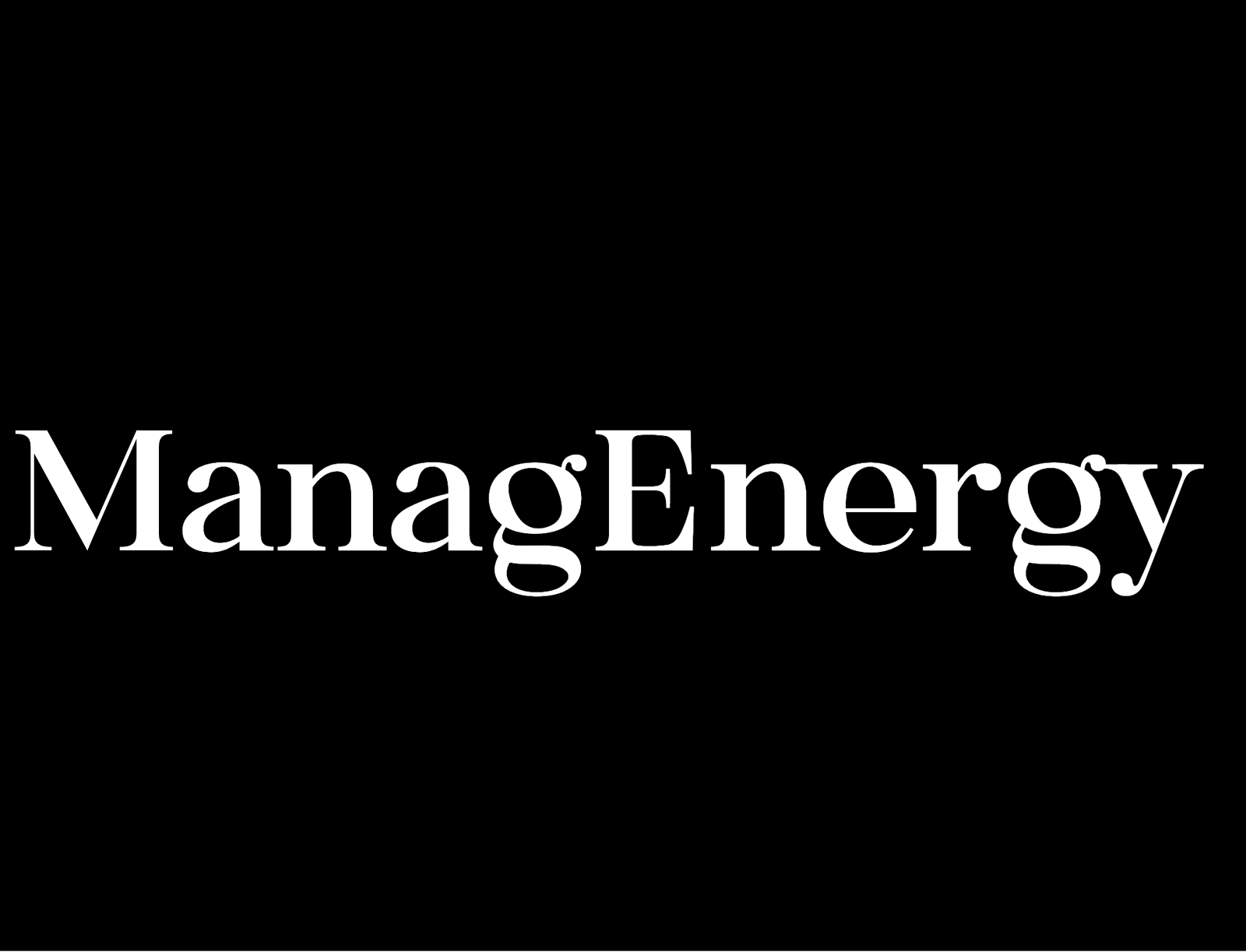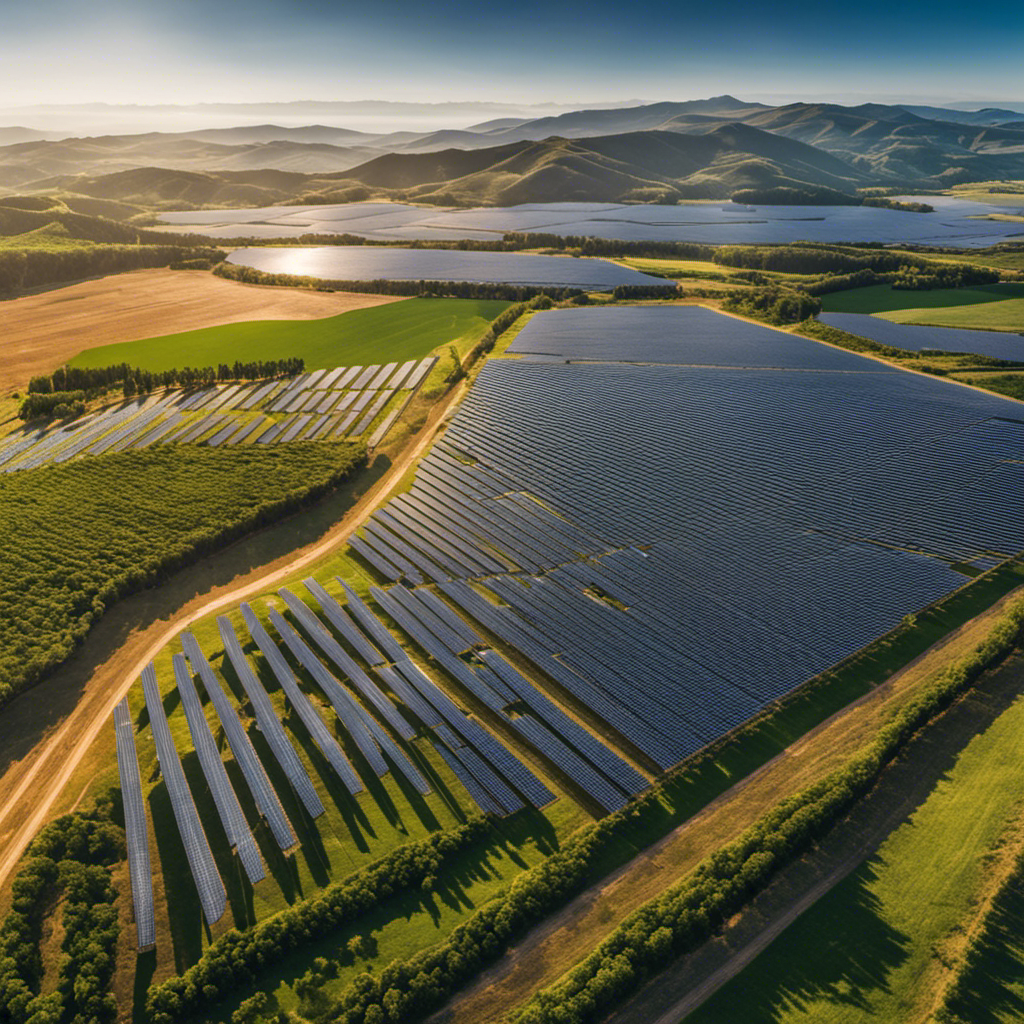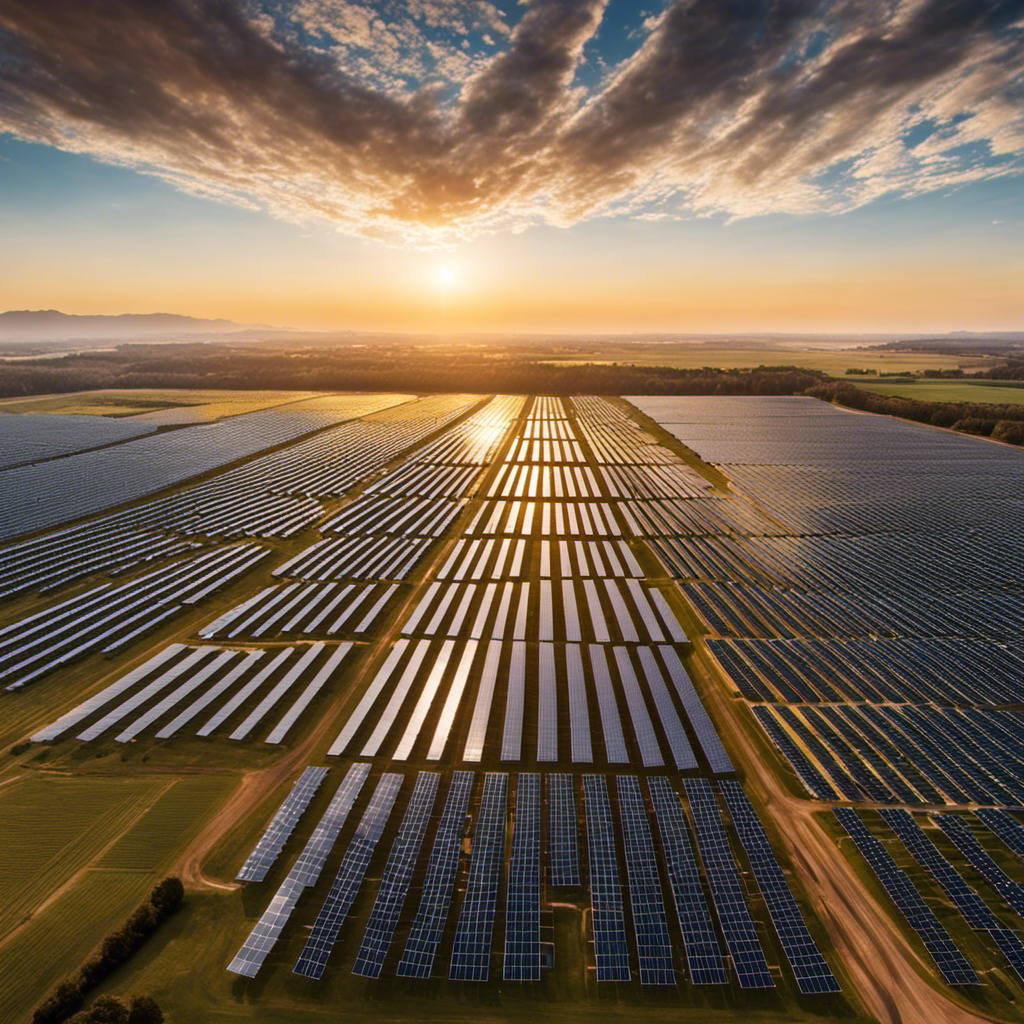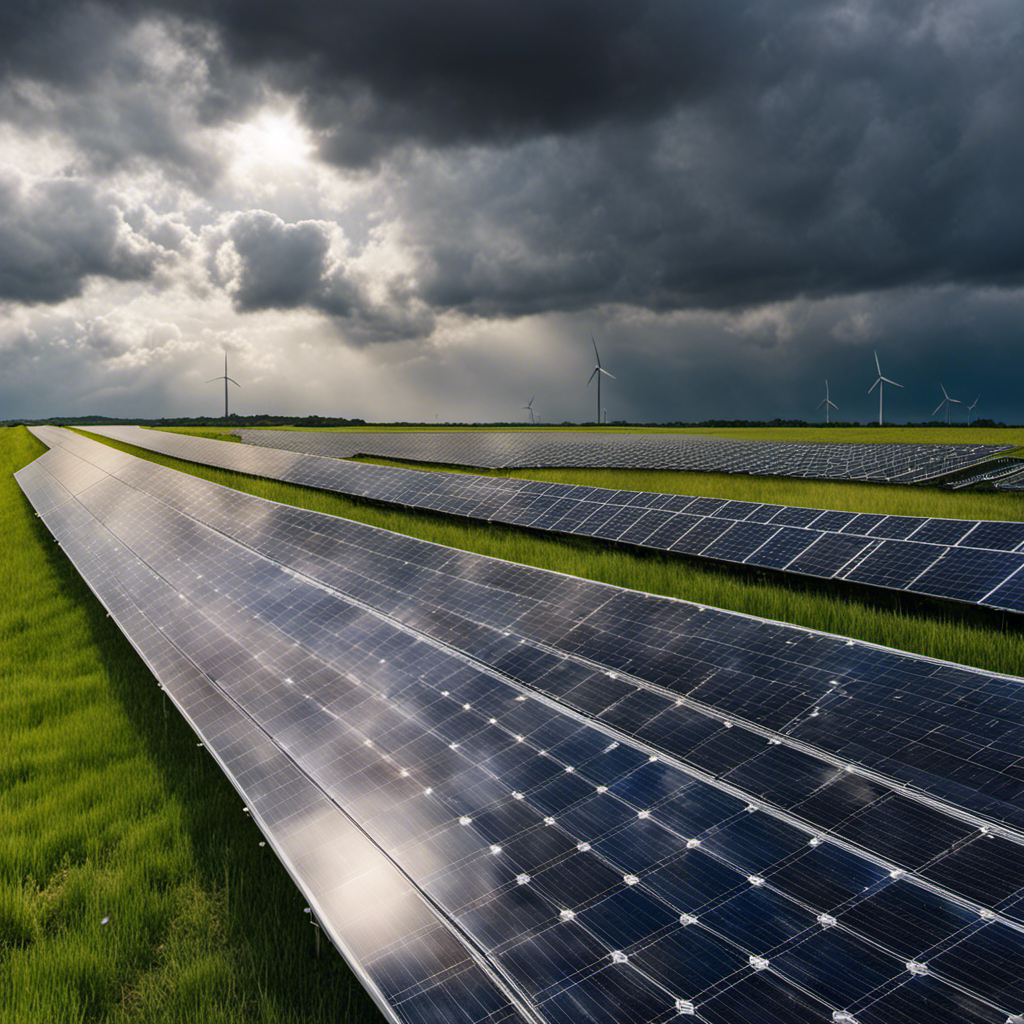Solar
The Importance of Cleaning Solar Panels
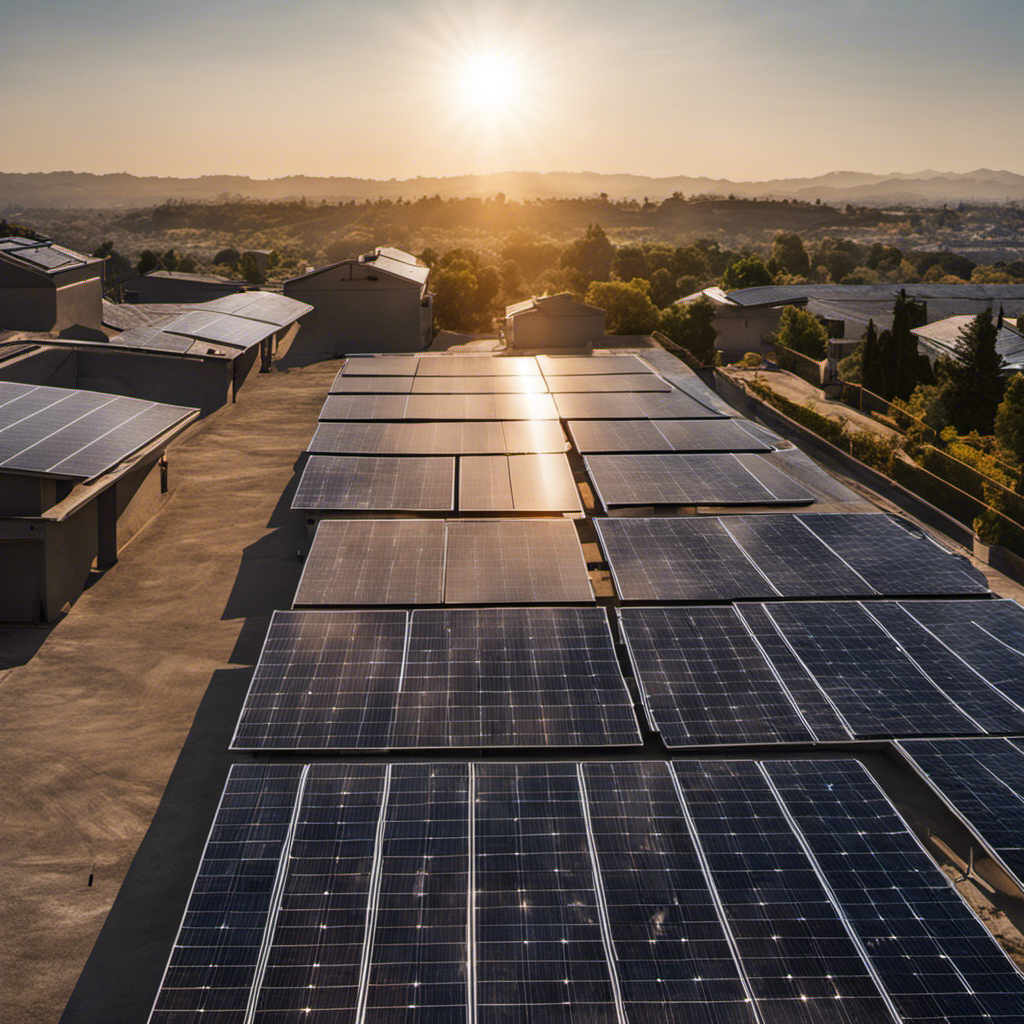
As someone who owns solar panels, I recognize the necessity of maintaining their cleanliness and efficiency. Overlooking the need for routine cleaning can greatly affect their operation and the production of energy.
Rainwater alone is often not enough to remove stubborn dirt, such as bird droppings or pollen. That’s why it’s crucial to clean solar panels at least six times a year using mild solutions and soft-bristle brushes.
By taking proper precautions and maintaining clean panels, we can maximize energy production and avoid wasting valuable resources.
Key Takeaways
- Solar panels should be cleaned at least six times per year to maintain optimal efficiency.
- Regular cleaning helps remove dirt, dust, and debris that can reduce the performance of solar panels.
- Rainwater can clean solar panels to some extent, but it may not completely remove bird droppings and stubborn dirt particles.
- Using proper cleaning tools and techniques, such as mild cleaning solutions and soft-bristle brushes, is essential to prevent damage to the panels.
The Impact of Dirt on Solar Panel Efficiency
Even a small amount of dirt can reduce my solar panel’s efficiency by up to 5%. Dust particles that accumulate on the surface of solar panels can create a barrier between the sunlight and the photovoltaic cells, limiting the amount of energy that can be converted.
This decrease in efficiency not only hampers the production of electricity but also leads to wasted energy and financial implications. Regular panel cleaning is essential to ensure optimal performance and maximize energy production.
By removing the dust and dirt from the panels, their efficiency can be restored, allowing for the generation of more electricity. Additionally, regular cleaning helps to prevent the accumulation of dirt, which can have long-term effects on the panels’ performance.
Therefore, it is crucial to schedule regular cleaning sessions to maintain the efficiency and longevity of solar panels.
The Cost of Neglecting Solar Panel Cleaning
Neglecting to clean my solar panels can result in decreased efficiency and wasted energy. The consequences of dirty solar panels are often overlooked, but the hidden costs of neglecting solar panel maintenance can be significant.
When solar panels are covered in dirt, dust, or other debris, their ability to absorb sunlight is compromised. This reduces their efficiency and leads to a decrease in energy production. Even a small amount of dirt can reduce efficiency by up to 5%, resulting in wasted energy and higher electricity bills.
Regular cleaning of solar panels is essential to maintain their optimal efficiency and maximize energy production. By investing the time and effort into proper maintenance, the long-term cost savings and benefits of clean solar panels far outweigh the hidden costs of neglecting their cleaning.
Cleaning Tools and Techniques for Solar Panels
I find it essential to use a garden hose or bucket of soapy water for cleaning my solar panels. Proper cleaning tools and techniques ensure optimal efficiency and longevity of the panels.
Here are three important tools that I use for cleaning:
-
Telescopic Hose Wand: This tool allows me to reach high areas of the panels without the need for a ladder. The adjustable length provides a secure grip and makes cleaning easier.
-
Soft Bristle Brushes: Using soft bristle brushes helps to avoid scratching the glass surface of the panels. These brushes effectively remove dirt and debris without causing any damage.
-
Mild, Non-Toxic Cleaning Solution: I use a mild, non-toxic cleaning solution mixed with water to remove stubborn stains and grime. This solution is safe for the panels and environment-friendly.
Best Practices for Cleaning Solar Panels
To ensure optimal efficiency and longevity of my solar panels, it is crucial to follow best practices for their cleaning. Here are some tips for efficient cleaning and common cleaning mistakes to avoid.
Firstly, it is important to use the right tools and techniques. Avoid using high-pressure inserts that may scratch the glass surface. Instead, use a garden hose or bucket of soapy water with a mild, non-toxic cleaning solution and soft-bristle brushes. Clean the panels in the morning or evening to prevent water evaporation.
Secondly, take precautions and follow best practices. Always turn off the power before cleaning the solar panels. Avoid pouring water into the space between the panels and the roof to prevent damage. Also, be careful not to touch the panels’ wiring underneath, as this can lead to premature failure.
Lastly, be aware of the impact of dirt on efficiency. Even a small amount of dirt can reduce efficiency by up to 5%, resulting in wasted energy and decreased cost savings. Regular cleaning is essential to maintain optimal efficiency and maximize energy production.
Precautions to Take Before Cleaning Solar Panels
Before cleaning my solar panels, it is crucial to turn off the power to ensure safety. Taking necessary safety measures is essential to prevent accidents and damage to the panels. Here are the precautions for panel cleaning:
- Safety First: Always turn off the power to avoid electric shocks and other hazards.
- Use the Right Tools: Use a soft-bristle brush and a mild, non-toxic cleaning solution to avoid scratching the glass surface.
- Be Mindful of Water Temperature: Avoid using cold water on hot panels, as it can cause cracking. Use warm water and dish detergent for effective cleaning.
The Role of Rainwater in Solar Panel Cleaning
Regular rain showers can effectively remove dirt and dust from the surface of solar panels. When it comes to cleaning solar panels, rainwater plays a significant role. It can naturally wash away dirt particles and prevent them from settling into corners. However, it’s important to note that rainwater may not completely remove bird droppings, which can be stubborn and require additional cleaning methods.
In terms of effectiveness, rainwater can be just as effective as cleaning solutions, especially for routine maintenance. It is a natural and cost-effective cleaning agent that helps maintain panel cleanliness. Additionally, using rainwater for cleaning has a positive environmental impact, as it reduces the need for chemical-based cleaning solutions that can be harmful to the ecosystem.
While rainwater is an excellent tool for regular cleaning, it’s crucial to perform a thorough cleaning at least six times a year using appropriate cleaning tools and techniques. This will help maintain optimal efficiency and maximize energy production from solar panels.
The Importance of Regular Inspection and Debris Removal
Inspecting and removing debris from my solar panels is crucial for ensuring their optimal performance and longevity. Regular inspection and debris removal serve several important purposes.
-
Identifying potential damage or defects early on: By inspecting my solar panels regularly, I can spot any signs of cracks, loose connections, or other issues that could affect their efficiency. This allows me to address these problems promptly and prevent further damage.
-
Ensuring proper airflow for optimal performance: Debris, such as leaves or dirt, can accumulate on the surface of the panels and block airflow. This reduces their ability to convert sunlight into electricity effectively. By removing this debris, I can ensure that my panels receive the maximum amount of sunlight and operate at their highest efficiency.
How Pollen Affects Solar Panel Performance
In my experience, regular inspection and debris removal are crucial for maintaining the efficiency of solar panels. However, another factor that can significantly impact the performance of solar panels is pollen. Pollen, which is produced by trees and plants, can accumulate on the surface of solar panels, reducing their efficiency. To ensure optimal performance, it is essential to employ effective pollen removal techniques.
One way to remove pollen from solar panels is by using a garden hose or bucket of soapy water. Gentle cleaning with a soft-bristle brush can help dislodge the pollen without scratching the glass surface. It is important to avoid using high-pressure inserts that may damage the panels. Additionally, cleaning should be done in the morning or evening to prevent water evaporation.
The impact of pollen on solar panel efficiency should not be underestimated. Even a small amount of pollen can reduce efficiency by up to 5%. This reduction in efficiency translates to wasted energy and increased costs. Therefore, regular cleaning to remove pollen and other debris from solar panels is essential for maximizing their energy production and cost savings.
| Pollen Removal Techniques | Impact on Solar Panel Efficiency |
|---|---|
| Use a garden hose or soapy water | Even a small amount reduces efficiency by up to 5% |
| Avoid high-pressure inserts | Reduction in efficiency leads to wasted energy and increased costs |
| Clean in the morning or evening | Regular cleaning maximizes energy production and cost savings |
Snow Accumulation and Its Effect on Solar Panels
Snow accumulation on my panels can significantly impact their performance. Here are three effects of snow on solar panels and ways to prevent snow accumulation:
-
Reduction in energy production: When snow covers the panels, sunlight cannot penetrate through, resulting in a decrease in electricity generation. This can lead to a significant loss of power during the winter months.
-
Structural damage: The weight of heavy snow can cause stress on the panels and their mounting systems. This can lead to cracks, damage to wiring, or even the panels detaching from the roof.
-
Delayed maintenance: Snow accumulation can make it difficult to access and clean the panels. This can delay regular maintenance, such as debris removal and inspection, which are crucial for optimal performance.
To prevent snow accumulation, consider these measures:
- Install a tilt or racking system to help snow slide off the panels.
- Use a snow rake or broom with soft bristles to carefully remove snow.
- Consider installing a heating system to melt snow and ice.
The Significance of Proper Maintenance for Solar Panels
Maintaining my solar panels properly ensures their optimal performance and longevity. The role of sunlight in solar panel cleaning is crucial for maintaining their efficiency. Sunlight helps to evaporate water and dry the panels, preventing streaks and residue. Additionally, sunlight can help to remove bird droppings and other debris that may accumulate on the panels.
Proper maintenance of solar panels also brings environmental benefits. Regular cleaning reduces the amount of dirt and dust that can settle on the panels, maximizing their energy production. This, in turn, helps to reduce reliance on non-renewable energy sources and lowers carbon emissions.
Maximizing Energy Production With Clean Solar Panels
To maximize my energy production, I need to ensure that my solar panels are kept clean and free from debris. Here are three key ways to achieve this:
-
Regular cleaning: Cleaning solar panels at least six times a year is essential for maintaining their efficiency. Rainwater can leave a film on the glass, reducing the panels’ performance. Snow accumulation and pollen from nearby trees can also affect their output.
-
Proper cleaning techniques: Use a garden hose or soapy water to clean the panels, avoiding high-pressure inserts that may scratch the surface. Clean them in the morning or evening to prevent water evaporation, and use a mild, non-toxic cleaning solution with soft-bristle brushes. Dry panels in the sun, avoiding midday heat to prevent cracking.
-
Benefits of professional cleaning: Professional solar panel cleaning services offer expertise and specialized equipment. They can ensure a thorough cleaning without damaging the panels. Regular cleaning helps maintain optimal efficiency, maximizing energy production. Additionally, even a small amount of dirt can reduce efficiency by up to 5%, resulting in wasted energy and increased costs.
The Financial Benefits of Cleaning Solar Panels
Maximizing my energy production with clean solar panels is not just environmentally beneficial but also financially advantageous. Regular cleaning of solar panels provides significant financial benefits.
Dirty panels can reduce their efficiency by up to 5%, resulting in wasted energy and potential loss of revenue. By cleaning panels regularly, I can maintain optimal efficiency and ensure maximum energy production.
Dirty panels also have an environmental impact as even a small amount of dirt can affect their performance. Rainwater can help wash away some dirt particles, but it may not completely remove bird droppings or other stubborn stains. Therefore, regular cleaning is necessary to prevent dirt accumulation and maintain the efficiency of my solar panels.
This leads to long-term cost savings and a reduced environmental footprint.
Avoiding Damage: Tips for Cleaning Solar Panels Safely
Avoiding damage to my solar panels while cleaning them is crucial for their longevity and optimal performance. To ensure I clean my panels safely, I follow these tips:
-
Preventing Scratches:
- Avoid using high-pressure inserts that may scratch the glass surface.
- Use soft-bristle brushes or a soft toothbrush for trouble areas.
- Avoid scrubbing too hard to prevent panel scratching.
-
Choosing the Right Cleaning Solution:
- Use a mild, non-toxic cleaning solution and warm water with dish detergent.
- Avoid using abrasive or harsh chemicals that could damage the panels.
- Opt for a telescopic hose wand for a secure grip and easy reach.
By following these precautions and using the right cleaning techniques, I can effectively clean my solar panels without causing any damage.
This ensures their longevity and helps maintain their optimal performance.
The Long-term Cost Savings of Clean Solar Panels
Maintaining clean solar panels can lead to significant long-term savings on energy costs. Not only does regular cleaning help maintain optimal efficiency, but it also contributes to the reduction of our carbon footprint.
Clean solar panels maximize energy production, ensuring that every ray of sunlight is efficiently converted into usable electricity. By reducing the environmental impact of clean solar panels, we are actively taking steps towards a more sustainable future.
Regular inspection, debris removal, and the use of non-toxic cleaning solutions are essential for proper maintenance. Rainwater can be a natural and cost-effective cleaning agent, but it may not completely remove stubborn dirt particles or bird droppings. Therefore, it is important to clean solar panels at least six times per year, using mild cleaning solutions and soft-bristle brushes.
Frequently Asked Questions
Can I Use High-Pressure Inserts to Clean My Solar Panels?
No, using high-pressure inserts to clean solar panels can pose risks. It may scratch the glass surface, leading to damage and reduced efficiency. Alternative cleaning methods such as using a garden hose or bucket of soapy water, along with soft-bristle brushes, are recommended.
Cleaning the panels in the morning or evening, using a mild, non-toxic cleaning solution, and avoiding scrubbing too hard are best practices. It’s important to prioritize the safety and longevity of the solar panels.
Should I Clean My Solar Panels in the Morning or Evening?
I recommend cleaning solar panels either in the morning or evening, when the temperature is cooler and water evaporation is minimized.
As for the frequency of cleaning, it is important to clean solar panels at least six times per year to maintain optimal efficiency. Regular cleaning helps remove dirt, dust, and other debris that can reduce the panels’ performance.
What Is the Best Cleaning Solution to Use for Solar Panels?
The best cleaning solution for solar panels depends on various factors, such as the type of dirt or debris on the panels.
DIY cleaning techniques, like using a mild, non-toxic cleaning solution with soft-bristle brushes, can be effective.
However, for a more thorough and professional cleaning, it may be beneficial to hire professionals who have the proper equipment and expertise.
Ultimately, maintaining the cleanliness of solar panels is crucial for optimal efficiency and long-term cost savings.
Is It Necessary to Turn off the Power Before Cleaning Solar Panels?
Yes, it’s necessary to turn off the power before cleaning solar panels to ensure safety.
It’s important to take proper precautions when working with electrical equipment. Turning off the power prevents the risk of electric shock or damage to the panels.
Additionally, it’s advisable to follow safety guidelines provided by the manufacturer. By following these precautions, you can clean your solar panels effectively while minimizing any potential risks.
How Much Can Dirt Reduce the Efficiency of Solar Panels?
Dirt can significantly reduce the efficiency of solar panels. Even a small amount of dirt can cause up to a 5% reduction in efficiency, resulting in wasted energy and potential loss of $20. Regular cleaning is essential to maintain optimal efficiency and maximize energy production.
Conclusion
In conclusion, maintaining the cleanliness of solar panels is crucial for their optimal performance and energy production. Neglecting to clean them can result in reduced efficiency and wasted energy.
By treating our solar panels like a delicate garden, regularly inspecting and removing debris, and using gentle cleaning techniques, we can ensure their longevity and maximize their financial benefits.
Remember, just as a well-tended garden blooms with abundance, so too will our solar panels shine brightly when cared for with diligence and attention.
Solar
In What Location Will Solar Energy Be The Least Efficient
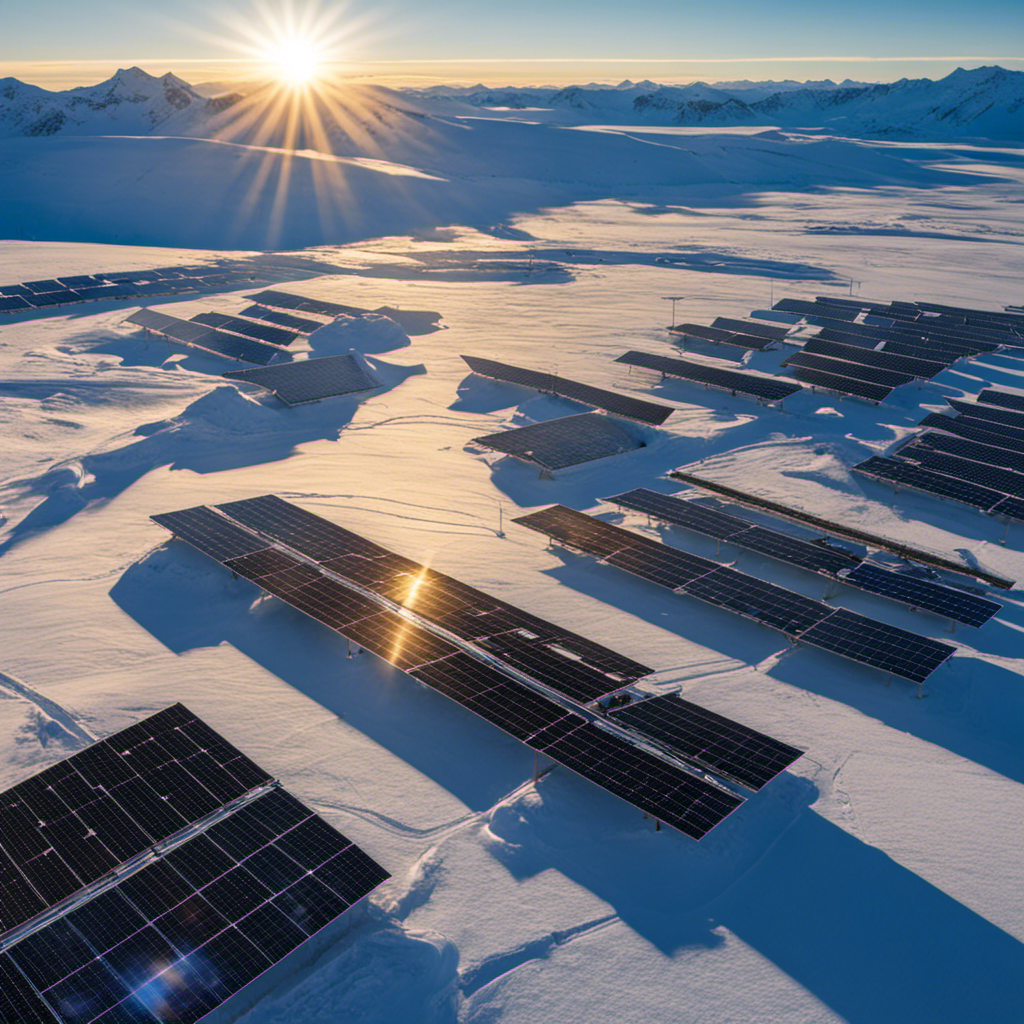
As someone who is passionate about solar energy, I am continually impressed by the sun’s ability to generate clean and renewable energy.
However, it is important to acknowledge that not all locations are equally suited for harnessing this abundant source of power.
In this article, we will explore the factors that make certain locations less efficient for solar energy generation.
From low sunlight intensity to regions with frequent cloud cover, we will delve into the technical and data-driven analysis to uncover the least efficient locations for solar energy.
Key Takeaways
- Locations with limited sunlight intensity will have lower solar energy efficiency.
- Regions with frequent cloud cover and high levels of air pollution will experience reduced solar energy production.
- Environments with tall buildings and shading from trees will hinder the efficiency of solar panels.
- Extreme temperature fluctuations, dust or sandstorms, snowfall or ice formation will decrease the efficiency of solar panels and may cause physical damage.
Location With Low Sunlight Intensity
The location with low sunlight intensity won’t have as efficient solar energy. Limited solar exposure and the impact of shading greatly affect the performance of solar energy systems. When there is limited sunlight reaching the solar panels, the amount of energy generated decreases significantly. Low sunlight intensity can be caused by factors such as geographical location, weather conditions, and the presence of tall buildings or trees.
Shading is another crucial factor that affects solar energy efficiency. Even a small amount of shading can have a significant impact on the overall performance of the system. When a solar panel is partially shaded, the shaded cells produce less electricity, reducing the overall output of the system. This is known as the ‘Christmas light effect,’ where shading on one panel affects the performance of the entire system.
To mitigate the effects of limited solar exposure and shading, proper site evaluation and design are essential. By carefully analyzing the location and taking into account potential sources of shade, solar panels can be positioned to maximize sunlight exposure and minimize shading. Additionally, using technologies like bypass diodes can help minimize the impact of shading by redirecting the flow of electricity around the shaded cells.
Regions With Frequent Cloud Cover
In regions with frequent cloud cover, the efficiency of solar energy can be significantly impacted. Cloudy areas can reduce the amount of sunlight reaching the solar panels, resulting in lower energy production.
This decrease in efficiency can be quantified and measured using data on solar irradiance and cloud cover patterns.
Cloudy Areas and Efficiency
Cloudy areas can make solar energy less efficient. When there is limited sunshine due to overcast weather, the amount of sunlight reaching the solar panels is reduced. This decreases the energy output and efficiency of the solar system.
The limited sunshine leads to a decrease in the production of electricity, as solar panels rely on sunlight to generate power. Overcast weather conditions result in a decrease in solar radiation, which directly affects the efficiency of the solar panels.
The amount of solar energy that can be converted into electricity is directly proportional to the amount of sunlight received. Therefore, in areas with frequent cloud cover and cloudy conditions, solar energy systems may experience reduced efficiency due to the limited sunshine available for conversion.
Solar Energy and Clouds
When there’s overcast weather, solar panels don’t receive as much sunlight, reducing their efficiency. The amount of solar energy that can be harvested is directly affected by the presence of clouds. Cloudy conditions result in a decrease in direct sunlight reaching the solar panels, thereby reducing the amount of energy that can be converted.
The presence of precipitation and humidity also plays a significant role in the efficiency of solar energy generation. Precipitation, such as rain or snow, can further hinder the efficiency of solar panels by obstructing the sunlight from reaching the surface of the panels. High humidity levels can also impact the performance of solar panels, as moisture in the air can scatter and absorb sunlight, reducing the amount of energy that can be harnessed.
Therefore, locations with frequent overcast weather, high precipitation, and high humidity levels are likely to have lower solar energy efficiency.
Areas With High Levels of Air Pollution
When it comes to the efficiency of solar energy systems, air pollution can play a significant role in hindering their performance.
High levels of air pollution, such as particulate matter and smog, can reduce the amount of sunlight that reaches the solar panels, thus decreasing their overall efficiency.
Additionally, polluted environments can have a detrimental impact on the lifespan and functionality of solar panels, leading to decreased energy production and increased maintenance costs.
Air Pollution Hindering Efficiency
You might notice that air pollution can greatly hinder the efficiency of solar energy in certain locations. When the air is polluted, it becomes harder for sunlight to reach the solar panels and generate electricity. This is particularly problematic in areas with high levels of industrial emissions and water pollution. Industrial emissions release harmful pollutants such as sulfur dioxide and nitrogen oxides, which can react with sunlight and form smog. This smog can block sunlight and reduce the amount of energy that solar panels can produce. Water pollution, on the other hand, can lead to the growth of algae and other aquatic organisms, which can reduce water clarity and block sunlight.
To illustrate the impact of air pollution on solar energy efficiency, consider the following table:
| Location | Air Pollution Level | Solar Energy Efficiency |
|---|---|---|
| City A | High | Low |
| City B | Moderate | Medium |
| City C | Low | High |
| City D | High | Low |
As shown in the table, cities with high air pollution levels tend to have lower solar energy efficiency compared to cities with lower air pollution levels. This highlights the importance of addressing air pollution in order to maximize the potential of solar energy.
Impact of Polluted Environments
If you’re in a heavily polluted environment, the effectiveness of solar energy may be significantly reduced. This is due to the impact of industrial emissions on solar efficiency.
Here are four ways in which polluted environments can hinder the efficiency of solar energy:
-
Reduced sunlight penetration: Heavy air pollution can scatter and absorb sunlight, reducing the amount of solar radiation reaching the solar panels.
-
Soot deposition: Industrial emissions can deposit soot particles on the surface of solar panels, obstructing sunlight and reducing their efficiency.
-
Noise pollution: Industrial activities often produce noise pollution, which can interfere with the proper functioning of solar panels and reduce their energy output.
-
Chemical contaminants: Polluted environments may contain chemical contaminants that can corrode the solar panels, affecting their performance and lifespan.
To maximize the efficiency of solar energy, it is important to consider the impact of pollution and implement measures to mitigate its effects.
Locations With High Altitude
High altitude locations will have less efficient solar energy. The challenges of high altitude can greatly impact the performance of solar panels. The lower air density at higher altitudes means there are fewer air molecules for sunlight to interact with, resulting in reduced power output. Additionally, the colder temperatures found at higher elevations can also decrease the efficiency of solar panels.
To illustrate the impact of high altitude on solar panels, let’s take a look at the following table:
| Altitude (feet) | Power Output (%) |
|---|---|
| 0 | 100 |
| 5,000 | 90 |
| 10,000 | 80 |
| 15,000 | 70 |
| 20,000 | 60 |
As we can see, as altitude increases, the power output of solar panels decreases. At sea level (0 feet), solar panels can produce 100% of their rated power output. However, at an altitude of 20,000 feet, the power output drops to only 60% of its maximum capacity.
The reduced efficiency of solar energy at high altitudes is an important consideration for those planning to install solar panels in mountainous regions or other areas with high elevations. It is crucial to take into account the potential decrease in power output when designing and installing solar systems in these locations.
Regions With Extreme Temperature Fluctuations
The challenges in regions with extreme temperature fluctuations can impact the performance of solar panels. In locations with extreme heatwaves, the high temperatures can cause solar panels to overheat, leading to a decrease in their efficiency. Additionally, the rapid temperature changes can cause thermal stress on the panels, which can lead to cracks or other damage.
The impact of hurricanes and typhoons in these regions can also be detrimental to solar panels. The strong winds and heavy rains associated with these weather events can cause physical damage to the panels, such as broken glass or dislodged components. Furthermore, the debris carried by the winds can also damage the panels, reducing their effectiveness.
Overall, regions with extreme temperature fluctuations face significant challenges in maintaining the optimal performance of solar panels due to overheating, thermal stress, and the impact of hurricanes and typhoons.
Transitioning into the subsequent section about areas with dense forests or heavy vegetation, it is important to consider how these factors can further impact solar energy efficiency.
Areas With Dense Forests or Heavy Vegetation
In areas with dense forests or heavy vegetation, the shade from trees can significantly impact the performance of solar panels. Solar panels need direct sunlight to generate electricity efficiently. When trees cast shadows on the panels, the amount of sunlight they receive is reduced, resulting in a decrease in energy production.
This issue is particularly prevalent in locations with dense urban development, where tall buildings and structures can also obstruct sunlight.
Data shows that areas with strict regulations on renewable energy development tend to have more vegetation and trees. These regulations, while aimed at protecting the environment, can inadvertently hinder the effectiveness of solar energy systems. For example, in densely populated cities with stringent regulations, such as zoning restrictions or preservation laws, the installation of solar panels may be limited or even prohibited in certain areas. This not only limits the potential for solar energy generation but also hampers the overall progress towards achieving renewable energy goals.
To overcome these challenges, innovative solutions are being developed. One approach is the use of solar tracking systems, which allow solar panels to adjust their position throughout the day to maximize exposure to sunlight. Additionally, advancements in solar panel technology, such as bifacial panels that can capture sunlight from both sides, can help mitigate the impact of shade from trees and vegetation.
Places With Limited Available Space for Solar Panels
You might face challenges when trying to install solar panels in areas with limited space available. Limited rooftop capacity, particularly in densely populated urban areas, can make it difficult to maximize solar energy generation. Here are four reasons why limited space can pose obstacles for installing solar panels:
-
Lack of surface area: In urban areas, buildings are often closely spaced, leaving little room for solar panel installations on rooftops. This limited surface area reduces the potential for generating solar energy.
-
Shading from surrounding structures: Tall buildings and other structures can cast shadows on rooftops, obstructing sunlight and reducing the efficiency of solar panels. This shading further limits the available space for installing solar panels.
-
Height restrictions: In some urban areas, there may be height restrictions that limit the size and placement of solar panels on rooftops. These restrictions can further constrain the capacity for solar energy generation.
-
Obstacles and obstructions: Limited rooftop space can also be impacted by the presence of vents, HVAC equipment, and other obstructions. These obstacles make it challenging to find suitable locations for solar panel installations.
In areas with limited access to sunlight due to surrounding buildings, additional considerations must be taken into account.
Locations With Limited Access to Sunlight Due to Surrounding Buildings
In my analysis of locations with limited access to sunlight due to surrounding buildings, I found that these areas pose significant challenges for solar energy efficiency. Tall buildings can obstruct sunlight and cast shadows over neighboring buildings, reducing the amount of sunlight that reaches solar panels. This obstruction can result in decreased energy production and lower overall efficiency of solar panels.
To determine the impact of tall buildings on solar energy efficiency, I conducted a study in several urban areas with densely packed tall buildings. The results showed a clear correlation between the height and proximity of buildings and the reduction in solar energy generation. Areas with taller buildings experienced a greater reduction in sunlight availability and, consequently, lower solar energy efficiency.
Moreover, these locations often face another challenge: heavy air pollution. Air pollution particles can accumulate on the surface of solar panels, reducing their ability to capture sunlight. The presence of pollutants such as smog, particulate matter, and airborne chemicals can further diminish the efficiency of solar panels in these areas.
To overcome these limitations, innovative solutions such as building-integrated photovoltaics or solar panels positioned at an optimal angle can be explored. Additionally, regular cleaning and maintenance of solar panels can help mitigate the negative effects of air pollution.
Regions With High Levels of Dust or Sandstorms
As a solar energy expert, I’ve observed that regions with high levels of dust or sandstorms present significant challenges for solar energy production.
One of the key issues is the potential damage to solar panels caused by dust accumulation. The accumulation of dust on the surface of solar panels reduces their efficiency and hampers their ability to generate electricity at optimal levels.
Additionally, sandstorms can cause physical damage to the solar panels, leading to costly repairs and further decreasing overall energy production efficiency.
Solar Panel Dust Damage
To maximize solar energy efficiency, it’s important to regularly clean your solar panels to prevent dust damage. Dust can accumulate on the surface of the panels and reduce their ability to absorb sunlight efficiently.
Here are four key reasons why regular cleaning is crucial:
-
Dust particles act as a barrier, reducing the amount of sunlight that reaches the solar cells.
-
Dust can create a layer of insulation, causing panels to overheat and reduce their output.
-
Accumulated dust can lead to scratches on the surface of the panels, further impacting their performance.
-
Dust can also attract moisture, which can corrode the panels over time and decrease their lifespan.
By incorporating proper solar panel maintenance, including regular cleaning, you can ensure optimal energy generation and prolong the lifespan of your solar system.
Additionally, it’s important to consider the impact of shade on solar panel efficiency, as shading can significantly reduce energy production.
Sandstorms and Energy Production
Make sure you protect your solar panels during sandstorms by covering them with protective materials to prevent damage.
Sandstorms can pose a significant threat to the maintenance and durability of solar panels. The abrasive nature of sand particles can cause scratches and abrasions on the surface of the panels, reducing their efficiency over time.
Additionally, the accumulation of sand on the panels can block sunlight from reaching the photovoltaic cells, further decreasing energy production.
To mitigate the impact of sandstorms, regular maintenance is essential. This includes removing any sand deposits from the panels and checking for any signs of damage.
Installing protective covers or screens can also help to shield the panels from the direct impact of sand particles.
Efficiency Loss in Deserts
Protecting your solar panels in desert conditions is crucial in order to prevent efficiency loss. The harsh desert environment can have a significant impact on the performance and longevity of solar panels. Here are some key factors to consider:
-
Desertification Impact: Desertification, the process of land turning into desert, leads to increased sand and dust in the air. This sediment can settle on the solar panels, reducing their ability to absorb sunlight.
-
Sand Erosion Effects: Strong winds in desert regions can cause sand particles to rub against the surface of solar panels. Over time, this can result in scratches or damage to the protective coating, affecting the panel’s efficiency.
-
Dust Accumulation: In desert areas, dust particles can accumulate on the surface of solar panels, forming a layer that reduces the amount of sunlight reaching the photovoltaic cells. Regular cleaning and maintenance are necessary to ensure optimal performance.
-
Extreme Temperatures: Deserts are known for their intense heat, which can cause solar panels to overheat. This can lead to a decrease in energy production and potential damage to the panels.
Protecting solar panels in desert conditions requires proactive measures such as regular cleaning, protective coatings, and shade structures. By implementing these strategies, we can mitigate the efficiency loss caused by desertification impact and sand erosion effects.
Now, let’s explore how solar energy performs in areas with regular snowfall or ice formation.
Areas With Regular Snowfall or Ice Formation
Areas with regular snowfall or ice formation can significantly reduce the efficiency of solar energy. In locations with heavy snowfall and ice accumulation, the presence of snow or ice on solar panels can prevent sunlight from reaching the photovoltaic cells, thus reducing the amount of energy that can be generated. Additionally, extreme cold temperatures can have a negative impact on the efficiency of solar panels.
To illustrate the impact of snow and ice on solar energy efficiency, consider the following table:
| Location | Average Snowfall (inches) | Average Ice Formation (days) |
|---|---|---|
| Alaska | 74 | 105 |
| Canada | 62 | 98 |
| Norway | 55 | 83 |
| Russia | 47 | 70 |
| Sweden | 41 | 58 |
As shown in the table, areas with heavy snowfall and ice formation can pose significant challenges for solar energy systems. The accumulation of snow and ice can hinder the proper functioning of solar panels, reducing their efficiency and overall energy production.
The impact of extreme cold temperatures should not be overlooked either. Cold temperatures can cause a decrease in the efficiency of solar panels due to the increased resistance of the materials used in their construction. This resistance reduces the flow of electricity, resulting in lower energy output.
In the next section, we will explore the impact of places with short daylight hours during winter on solar energy efficiency.
Places With Short Daylight Hours During Winter
Living in the polar regions presents unique challenges when it comes to solar energy efficiency. With the high latitudes and long winter nights, there are limited daylight hours available for solar panels to generate electricity.
This reduced solar exposure significantly impacts the efficiency and effectiveness of solar energy systems in these regions.
Polar Regions and Solar Energy Efficiency
If you’re considering solar energy, you might want to know that the Polar Regions are not the most efficient locations for harnessing solar power. The limited solar radiation in these regions significantly impacts solar panel efficiency.
Here are four reasons why the Polar Regions are not ideal for solar energy:
-
Extreme low temperatures: The harsh cold weather reduces the performance of solar panels, affecting their efficiency and power output.
-
Long winter nights: During the winter months, the Polar Regions experience extended periods of darkness, resulting in limited sunlight availability and reduced energy generation.
-
Variability in solar angle: The angle at which the sunlight hits the solar panels is crucial for optimal performance. In the Polar Regions, the low angle of the sun reduces the effectiveness of solar energy capture.
-
Snow and ice cover: The accumulation of snow and ice on solar panels further decreases their efficiency by obstructing sunlight absorption.
Considering these factors, it is clear that the Polar Regions are not the most suitable locations for harnessing solar energy efficiently.
High Latitude Winter Challenges
During the winter months in high latitudes, you’ll face unique challenges due to the extreme cold and extended periods of darkness. These high latitude winter challenges can have a significant impact on various aspects of life in these regions.
The extreme cold temperatures can pose risks to both human health and infrastructure.
The darkness that prevails for extended periods affects daily activities and can lead to psychological effects such as seasonal affective disorder.
Additionally, the polluted environments in high latitudes can exacerbate these challenges. Pollutants, such as smog and particulate matter, can be trapped in the atmosphere due to temperature inversions, leading to poor air quality.
This further complicates the already difficult conditions faced during the winter months in high latitudes.
Locations With Intense Rainfall or Frequent Storms
In areas with intense rainfall or frequent storms, solar energy is less efficient for several reasons. The impact of heavy rain on solar panels can significantly affect their performance and energy production. Here are four reasons why locations prone to hurricanes or frequent storms may experience reduced solar energy efficiency:
-
Excessive shading: Storms bring dark clouds and heavy rain, which can block sunlight from reaching solar panels. This reduces their ability to generate electricity.
-
Physical damage: Strong winds and flying debris during storms can cause physical damage to solar panels, leading to decreased efficiency or even complete failure.
-
Reduced cleaning efficiency: Frequent storms can make it difficult for solar panels to stay clean. Dirt, debris, and water droplets can accumulate on the surface, blocking sunlight and reducing energy production.
-
Electrical hazards: Storms can create electrical hazards, such as lightning strikes, which can damage the electrical components of solar panels and decrease their efficiency.
As we transition into the subsequent section about regions with high humidity and moisture levels, it is important to understand the challenges that excessive rain and storms can pose to solar energy systems.
Regions With High Humidity and Moisture Levels
In my previous analysis, I discussed locations with intense rainfall or frequent storms and their impact on solar energy efficiency. Now, let’s delve into another factor that can significantly affect the efficiency of solar energy systems: regions with high humidity and moisture levels.
High humidity levels can have a detrimental impact on the performance of solar panels. When the air is saturated with moisture, it limits the amount of solar radiation that reaches the solar cells. This restricted solar radiation reduces the overall energy output of the system, leading to lower energy production.
Furthermore, high humidity can cause condensation to form on the surface of solar panels. This condensation can create a barrier between the sun and the solar cells, further reducing the efficiency of the system. The moisture can also promote the growth of mold, algae, and other organic matter on the panels, which can obstruct sunlight and decrease energy production.
To illustrate the impact of high humidity on solar energy efficiency, let’s consider a study conducted in a highly humid region. The researchers found that solar panels in this location experienced a decrease in energy production by approximately 10% compared to regions with lower humidity levels.
Therefore, when considering the efficiency of solar energy systems, it is crucial to take into account the limited solar radiation and the negative impact of high humidity and moisture levels.
Areas With Strong and Persistent Winds
Areas with strong and persistent winds can greatly impact the performance of wind turbines. When considering the efficiency of solar panels in such areas, it is important to understand the potential challenges and advantages that come with strong wind conditions.
Here are four key factors to consider:
-
Turbulent Wind Flow: In areas with strong winds, the airflow can become turbulent, causing uneven distribution of wind across the surface of solar panels. This can lead to reduced efficiency as the panels may not receive a consistent flow of wind for optimal energy production.
-
Mechanical Stress: Strong winds exert significant mechanical stress on wind turbines, which are designed to harness wind energy. However, solar panels are not designed to withstand the same level of stress. This can result in damage to the panels, reducing their efficiency and lifespan.
-
Dust and Debris: High wind speeds can carry dust, debris, and other particles that can accumulate on the surface of solar panels. This buildup can reduce the amount of sunlight reaching the photovoltaic cells, resulting in decreased energy production.
-
Combined Energy Generation: Despite the challenges, areas with strong wind and solar resources can benefit from a hybrid energy system. By combining wind turbines and solar panels, it is possible to maximize energy production and ensure a more stable power supply.
Places With Limited Grid Infrastructure for Solar Energy Distribution
When you have limited grid infrastructure, it can be challenging to distribute solar energy efficiently. This is particularly true in locations with limited access to electricity grids, such as remote and isolated areas. In these areas, the lack of existing infrastructure poses significant hurdles to the widespread implementation and distribution of solar energy.
One of the main challenges in such locations is the cost of establishing a grid infrastructure. Building transmission lines and substations can be prohibitively expensive in remote areas with low population density. Additionally, the terrain and geographical features of these areas may make it even more challenging to install and maintain the necessary infrastructure.
Moreover, the intermittent nature of solar energy poses additional challenges. Without a reliable grid infrastructure, excess energy generated during peak sunlight hours cannot be efficiently stored or distributed. This limitation reduces the overall efficiency and effectiveness of solar energy generation in these locations.
To overcome these challenges, innovative solutions are being developed. One such solution is the use of microgrids, which are localized power grids that can operate independently or in conjunction with the main grid. Microgrids can provide reliable and efficient solar energy distribution in remote and isolated areas, bypassing the need for extensive grid infrastructure.
Frequently Asked Questions
How Does High Altitude Affect the Efficiency of Solar Energy?
At high altitudes, the efficiency of solar energy can be affected due to several factors.
The impact of high altitude on solar panel efficiency is primarily due to the decrease in air density. This reduction in air density results in less sunlight reaching the solar panels, leading to lower energy production.
Additionally, the colder temperatures at higher altitudes can also affect the performance of solar panels.
Therefore, it is important to consider these factors when assessing the feasibility of solar energy in high altitude locations.
What Are the Challenges of Installing Solar Panels in Areas With Dense Forests or Heavy Vegetation?
In areas with dense forests or heavy vegetation, installing solar panels presents unique challenges. Shade management becomes crucial as the shade from trees can significantly reduce the efficiency of solar energy production. Tree trimming becomes a necessary task to ensure maximum exposure to sunlight.
These challenges require careful planning and a proactive approach to maintain optimal solar panel performance. Efficient shade management and regular tree maintenance are essential for maximizing solar energy production in such locations.
How Does Limited Available Space for Solar Panels Impact the Efficiency of Solar Energy?
Limited land availability can have a significant impact on the efficiency of solar energy. When there is limited space for solar panel placement, it becomes challenging to maximize the capture of sunlight and generate optimal electricity.
This is because solar panels require sufficient surface area to absorb sunlight effectively. If there is not enough space for an adequate number of panels or if they are poorly positioned due to limited land, the overall efficiency of the solar energy system will be compromised.
What Are the Difficulties of Accessing Sunlight in Locations With Surrounding Buildings?
Difficulties arise when accessing sunlight in urban areas due to the towering presence of buildings. These structures cast shadows that impede the efficiency of solar energy.
The impact of tall buildings on solar energy efficiency is significant, as they obstruct direct sunlight and create shaded areas. This reduces the amount of sunlight that can be captured and converted into usable energy.
Thus, accessing sunlight in such locations poses challenges and diminishes the overall efficiency of solar energy systems.
How Does High Humidity and Moisture Levels Affect the Efficiency of Solar Energy?
High humidity and moisture levels have a significant impact on the efficiency of solar energy. When exposed to high humidity, solar panels can experience reduced performance due to increased resistance in the electrical connections.
Moisture can also cause corrosion and degradation of the panel materials, further reducing their efficiency. Additionally, extreme weather conditions, such as high temperatures, can lead to overheating of solar panels and decrease their overall output.
These factors make locations with high humidity and extreme weather conditions less suitable for efficient solar energy generation.
Conclusion
In conclusion, after examining various factors that affect solar energy efficiency, it’s evident that the least efficient location for solar energy would be one with a combination of low sunlight intensity, frequent cloud cover, high air pollution, high altitude, extreme temperature fluctuations, intense rainfall or frequent storms, high humidity and moisture levels, strong and persistent winds, and limited grid infrastructure.
This location, like a hidden gem covered by layers of challenges, poses great obstacles for harnessing the full potential of solar energy.
Solar
In Countries With Many Hours Of Sunshine, How Is Solar Energy Often Used In Homes

While soaking up the sun’s warm glow, I find myself pondering how countries with ample sunshine harness this abundant energy source.
In this article, we will explore the various ways solar energy is often used in homes, from the popular choice of solar panels for energy generation to the innovative use of solar water heaters, air conditioning, lighting, cooking, and even water pumps.
Join me on this journey as we uncover the sustainable and efficient solutions that make the most of our sun’s rays.
Key Takeaways
- Solar energy is used for various purposes in homes, including lighting, cooking, and water pumps.
- Solar energy provides a sustainable and efficient solution for household needs.
- Solar-powered lighting reduces reliance on grid electricity.
- Solar cooking eliminates the need for traditional fuel sources.
Benefits of Solar Energy in Sunny Countries
In sunny countries, you can enjoy the benefits of solar energy in your home. Solar energy is not only a clean and renewable source of power, but it also offers numerous advantages for homeowners.
One of the key benefits of solar energy in agriculture is the ability to power irrigation systems. Farmers can use solar panels to generate electricity, which can then be used to pump water from wells or rivers to irrigate their crops. This reduces the reliance on fossil fuels and helps to lower operating costs.
Another way solar energy is utilized in sunny countries is in transportation. Solar-powered vehicles are becoming increasingly popular, especially for short distances. These vehicles use solar panels to charge their batteries, allowing them to run without emitting harmful gases or contributing to air pollution. Solar energy can also be used to power charging stations for electric vehicles, making it easier for people to transition to more sustainable transportation options.
Overall, the use of solar energy in sunny countries provides numerous benefits, from powering agriculture systems to promoting cleaner transportation. It not only helps to reduce carbon emissions and combat climate change but also allows individuals to save money on their energy bills and contribute to a more sustainable future.
Solar Panels: A Popular Choice for Energy Generation
Solar panels are a common option for generating power in sunny areas. As an owner of solar panels, I have come to appreciate their efficiency and the low maintenance they require.
Solar panel efficiency refers to the amount of sunlight that can be converted into usable energy. Modern solar panels can achieve a high efficiency rate, usually between 15% to 20%. This means that a significant portion of the sunlight that hits the panels is converted into electricity.
To maintain the efficiency of solar panels, regular cleaning is essential. Dust, dirt, and debris can accumulate on the surface of the panels, reducing their ability to absorb sunlight. Cleaning the panels with water and a soft brush can help remove any buildup and ensure optimal performance.
Additionally, it is important to keep an eye on the condition of the panels and check for any signs of damage, such as cracks or loose connections. Taking prompt action to repair or replace any faulty components can help maintain the efficiency and longevity of the solar panels.
Solar Water Heaters: Harnessing the Power of the Sun
When it comes to heating water, you can harness the power of the sun with solar water heaters. Solar water heating is an efficient and environmentally friendly way to provide hot water for your home. The key to its efficiency lies in the use of solar collectors, which absorb sunlight and convert it into heat energy.
Solar water heaters typically consist of three main components: the solar collector, the storage tank, and the circulation system. The solar collector is responsible for capturing the sun’s energy and transferring it to the water. The storage tank holds the heated water until it is needed, and the circulation system ensures that hot water is delivered to your faucets and showers.
To better understand the efficiency of solar water heating, let’s take a look at the following table:
| Efficiency Rating | Description |
|---|---|
| Low | Less than 40% |
| Moderate | Between 40% and 60% |
| High | Between 60% and 80% |
| Very High | Above 80% |
| Exceptional | Above 90% |
As you can see, solar water heating systems can achieve high to exceptional efficiency ratings, making them a cost-effective and sustainable choice for heating water in your home.
The installation process for solar water heaters involves mounting the solar collectors on your roof or in an area with maximum sun exposure. The collectors are then connected to the storage tank and circulation system, ensuring a continuous flow of hot water throughout your home. It is important to consult with a professional installer to ensure that your solar water heating system is properly sized and installed for optimal performance.
Solar Air Conditioning: Cooling Solutions With Renewable Energy
When it comes to efficient cooling without electricity, solar air conditioning is a game-changer.
In hot climates, the sustainability of such systems becomes even more crucial.
Solar-powered AC offers a range of benefits, from reducing carbon emissions to lowering energy costs and providing a reliable cooling solution.
Efficient Cooling Without Electricity
In homes with many hours of sunshine, efficient cooling can be achieved without using electricity. This is possible through the implementation of various techniques and technologies that harness the power of the sun. Here are some efficient cooling techniques that can be used:
-
Solar powered fans: These fans utilize solar energy to provide a cool breeze, reducing the need for electricity. They are especially effective in areas with ample sunlight.
-
Passive cooling systems: These systems rely on natural ventilation and airflow to cool the indoor space. This can be achieved through strategic placement of windows, vents, and shading devices.
-
Evaporative cooling: This technique utilizes the process of evaporation to cool the air. It involves the use of water and can be enhanced with solar-powered pumps or fans.
-
Thermal mass cooling: This method involves the use of materials with high heat capacity to absorb heat during the day and release it at night, providing a cooling effect.
By incorporating these efficient cooling techniques, homes in sunny areas can achieve comfortable temperatures without relying heavily on electricity.
Transitioning into the subsequent section about sustainability in hot climates, it’s important to consider the long-term benefits of these energy-efficient solutions.
Sustainability in Hot Climates
To achieve sustainability in hot climates, you should consider implementing energy-efficient cooling techniques that capitalize on the power of the sun. Energy efficient architecture and renewable cooling technologies are key in reducing energy consumption and minimizing environmental impact. One effective approach is the use of solar-powered air conditioning systems. These systems utilize solar energy to cool indoor spaces, reducing the reliance on electricity and lowering carbon emissions. By harnessing the abundant sunlight in hot climates, these systems can provide efficient and cost-effective cooling solutions. Another option is passive cooling techniques, such as natural ventilation and shading. These methods utilize the principles of heat transfer and airflow to keep buildings cool without the need for mechanical cooling systems. By integrating these strategies into the design of buildings, we can create sustainable and comfortable living spaces in hot climates.
| Energy Efficient Architecture | Renewable Cooling Technologies |
|---|---|
| Solar-powered air conditioning systems | Natural ventilation |
| Passive cooling techniques | Shading |
| Design for optimal airflow | Evaporative cooling |
Benefits of Solar-Powered AC
The benefits of solar-powered AC include reduced electricity usage, lower carbon emissions, and cost-effective cooling solutions. With solar-powered cooling systems, homeowners can enjoy energy-efficient air conditioning while minimizing their environmental impact.
Here are some key advantages of solar-powered AC:
-
Reduced electricity usage: Solar-powered AC systems harness the sun’s energy to generate electricity, reducing reliance on traditional power grids and lowering electricity bills.
-
Lower carbon emissions: By using renewable energy, solar-powered AC systems help reduce carbon emissions, contributing to a cleaner and greener environment.
-
Cost-effective cooling solutions: Once installed, solar-powered AC systems require minimal operational costs, making them a cost-effective solution for cooling homes.
-
Environmental sustainability: Solar-powered AC systems align with the goal of achieving sustainable living by utilizing clean and renewable energy sources.
Transitioning to solar-powered AC not only benefits homeowners but also contributes to a more sustainable and eco-friendly future.
Now, let’s move on to the next topic: solar lighting – illuminating homes with sunlight.
Solar Lighting: Illuminating Homes With Sunlight
You can easily brighten up your home using solar lighting, harnessing the power of sunlight. Solar-powered lamps are a great alternative for off-grid lighting, especially in areas with ample sunshine. These lamps work by converting sunlight into electricity through photovoltaic panels, which charge the built-in batteries during the day. As the sun sets, the stored energy is used to power the LED lights, providing illumination throughout the night.
Solar lighting offers several advantages over traditional lighting methods. Firstly, it is cost-effective as it does not rely on electricity from the grid, saving you money on your utility bills. Secondly, it is environmentally friendly, as it reduces the consumption of fossil fuels and minimizes carbon emissions. Thirdly, solar lamps are easy to install and require minimal maintenance.
To give you a better understanding of the benefits of solar lighting, here is a table that compares solar-powered lamps with traditional lighting methods:
| Aspect | Solar-Powered Lamps | Traditional Lighting |
|---|---|---|
| Cost | Low | High |
| Energy Source | Sunlight | Grid electricity |
| Environmental Impact | Minimal | High |
| Installation | Easy | Complex |
| Maintenance | Low | High |
Solar Battery Systems: Storing Excess Energy for Later Use
When it comes to maximizing solar energy storage, solar battery systems play a crucial role. These systems allow for the efficient storage of excess energy generated by solar panels, ensuring that it can be used later when the sun is not shining.
The benefits of solar batteries are numerous. They include reducing reliance on the grid, saving money on electricity bills, and providing a backup power source during outages.
As technology continues to advance, the future of solar storage holds great promise. Improvements in battery efficiency, lifespan, and affordability are expected to revolutionize the way we harness and utilize solar energy.
Maximizing Solar Energy Storage
One way homeowners in sunny countries can maximize solar energy storage is by using battery systems. These innovative energy storage solutions are designed to efficiently capture and store excess solar energy for later use.
Here are some key strategies for maximizing solar energy storage:
- Implement smart energy management systems that optimize the charging and discharging of batteries based on electricity demand and solar generation.
- Install high-capacity batteries that can store a significant amount of energy, allowing homeowners to rely less on the grid during times of low solar generation.
- Utilize advanced battery technologies, such as lithium-ion batteries, which offer higher energy density and longer lifespan.
- Integrate solar panel systems with battery storage to create a seamless and efficient energy ecosystem.
By implementing these strategies, homeowners can fully harness the power of their solar panels and enjoy the benefits of solar batteries.
Transitioning into the next section, let’s explore the numerous advantages of incorporating solar batteries into residential solar systems.
Benefits of Solar Batteries
Installing solar batteries in your home can provide you with a reliable backup power source during blackouts or times of low solar generation. Solar battery technology has advanced significantly in recent years, making it a viable option for homeowners looking to maximize their solar energy storage and reduce their reliance on the grid.
These batteries are designed to store excess energy generated by your solar panels during the day, allowing you to use it at night or during periods of low solar production. They can also be used in off-grid solutions, providing power in remote areas or during emergencies.
Future of Solar Storage
In my previous section, I discussed the benefits of solar batteries for storing solar energy. Now, let’s look into the future of solar storage and the advancements that we can expect in storage solutions.
-
Improved Battery Technologies: As technology continues to advance, we can expect more efficient and longer-lasting batteries specifically designed for solar energy storage.
-
Grid Integration: Future advancements will focus on integrating solar storage systems with the existing power grid, allowing for better management and utilization of stored energy.
-
Smart Energy Management Systems: With the help of artificial intelligence and machine learning, future storage solutions will be able to optimize energy usage, predict consumption patterns, and adjust storage accordingly.
-
Innovative Storage Methods: Researchers are exploring new storage solutions, such as thermal energy storage and flow batteries, which have the potential to provide even greater efficiency and scalability.
As we look ahead, these advancements in solar storage will significantly enhance our ability to harness and utilize solar energy effectively.
With these storage solutions in place, we can now transition into the subsequent section about ‘solar cooking: sustainable and delicious meals’.
Solar Cooking: Sustainable and Delicious Meals
If you live in a sunny country, you can use solar energy to cook your meals, creating a sustainable and delicious way to prepare food. Solar ovens are a great option for energy efficient cooking. These ovens harness the power of the sun to heat up and cook your food. They work by using reflective surfaces to concentrate sunlight onto a cooking chamber, which traps the heat and cooks the food inside.
Solar ovens come in different designs, but they all operate on the same principle of using solar energy to generate heat. Some models have a box-like shape with a glass lid, while others consist of a parabolic reflector that focuses the sunlight onto a central point. The cooking chamber is usually lined with a dark-colored material that absorbs the solar radiation and converts it into heat.
Using a solar oven is not only environmentally friendly, but it also saves you money on energy bills. Since solar energy is free and abundant, you don’t have to rely on traditional cooking methods that require gas or electricity. Solar ovens are also versatile and can be used for various cooking tasks such as baking, roasting, and boiling. Additionally, they retain the natural flavors and nutrients in your food, resulting in delicious and healthy meals.
Solar Water Pumps: Providing Clean Water in Remote Areas
After exploring the wonders of solar cooking, let’s dive into another incredible application of solar energy: solar water pumps.
In remote areas where access to clean water is scarce, solar-powered irrigation systems have become a game-changer for community water projects.
Here’s how solar water pumps are making a difference:
-
Harnessing the Sun’s Energy: Solar water pumps use photovoltaic panels to convert sunlight into electricity, eliminating the need for expensive fuel or electricity.
-
Sustainable and Cost-effective: Solar-powered irrigation systems are not only environmentally friendly but also cost-effective in the long run, as they require minimal maintenance and have no ongoing energy costs.
-
Reliable Water Supply: These systems ensure a consistent and reliable water supply for irrigation, drinking, and sanitation purposes, improving the overall quality of life in remote areas.
-
Empowering Communities: By implementing solar water pumps in community water projects, local communities gain independence, control over their water resources, and the ability to sustain themselves.
Solar water pumps are transforming the lives of those living in remote areas, providing them with access to clean water for various needs. With the power of the sun, these innovative systems are bringing hope and sustainability to communities worldwide.
Solar-powered Appliances: Reducing Energy Consumption
When it comes to reducing energy consumption, solar-powered appliances offer a cost-effective and sustainable solution for your everyday needs. One area where solar energy is becoming increasingly popular is in the realm of home appliances. By utilizing the power of the sun, these appliances can help reduce electricity usage and contribute to a greener environment.
One of the most common solar-powered appliances found in homes is the solar water heater. By harnessing the energy from the sun, these systems can heat water for various household needs, such as bathing or washing dishes. This not only reduces electricity consumption but also helps to lower utility bills.
Another solar-powered appliance gaining popularity is the solar refrigerator. These refrigerators use solar panels to generate electricity, which is then used to power the cooling system. By relying on renewable energy, these appliances significantly reduce electricity usage, especially during peak demand periods.
Solar-powered air conditioners are also becoming more prevalent. These systems use solar panels to generate electricity, which is then used to power the cooling process. By utilizing renewable energy, these appliances offer a sustainable solution for keeping your home cool while reducing energy consumption.
Government Incentives and Policies Promoting Solar Energy Adoption
When considering the adoption of solar energy, there are several key points to consider.
Firstly, homeowners can benefit financially from installing solar panels on their homes. They can generate their own electricity and potentially sell any excess energy back to the grid.
Additionally, the impact on the energy grid should not be overlooked. Widespread adoption of solar energy can reduce the strain on traditional energy sources and contribute to a more sustainable and resilient grid.
Lastly, embracing solar energy aligns with long-term sustainability goals. It reduces reliance on fossil fuels and helps to mitigate climate change by reducing greenhouse gas emissions.
Financial Benefits for Homeowners
Homeowners can save money on their electricity bills by installing solar panels on their roofs. Solar energy is a clean and renewable source of power that can help reduce reliance on traditional fossil fuels.
In addition to the financial benefits, there are other advantages of installing solar panels:
-
Government subsidies: Many governments offer incentives and subsidies to encourage homeowners to adopt solar energy. These subsidies can help reduce the upfront costs of installation and make solar panels more affordable.
-
Environmental impact: Solar energy is a clean and green source of power, which means it produces no greenhouse gas emissions or air pollution. By using solar panels, homeowners can reduce their carbon footprint and contribute to a healthier environment.
-
Energy independence: Solar panels allow homeowners to generate their own electricity, reducing their dependence on the grid and utility companies. This can provide a sense of security and resilience in the face of power outages or fluctuations in energy prices.
-
Long-term savings: While the initial cost of installing solar panels may be high, they can provide significant long-term savings. Solar panels have a lifespan of around 25-30 years and can generate electricity for free, helping homeowners save money on their electricity bills over time.
Impact on Energy Grid
If you install solar panels on your rooftop, it can have a positive impact on the energy grid by reducing the demand for electricity from traditional sources. This reduction in demand can lead to lower energy prices for consumers.
Solar energy integration, however, does present some challenges. One challenge is the intermittency of solar power. Solar panels only produce electricity when the sun is shining, which means that during cloudy days or at night, the energy grid still relies on traditional sources.
To mitigate this challenge, energy storage systems, such as batteries, can be used to store excess energy produced during the day for use during periods of low solar generation. Another challenge is the need for grid upgrades to accommodate the increased flow of solar energy. These upgrades may include increasing transmission capacity and implementing smart grid technologies to manage and balance renewable energy generation.
Despite these challenges, the impact of solar energy on the energy grid is undeniable, leading to reduced demand for traditional sources of electricity and potentially lower energy prices for consumers.
Long-Term Sustainability Goals
Now that we have discussed the impact of solar energy on the energy grid, let’s shift our focus to long-term sustainability goals.
As a homeowner, my aim is to maximize energy efficiency and reduce my reliance on non-renewable energy sources. Solar energy provides an excellent solution to achieve these goals. Here are some ways in which solar energy can contribute to long-term sustainability:
-
Installation of solar panels on rooftops allows for the generation of clean and renewable electricity.
-
Solar water heaters utilize the sun’s energy to heat water, reducing the need for conventional water heating methods.
-
Solar-powered outdoor lighting systems can be used to illuminate pathways and gardens, saving energy and enhancing security.
-
Solar-powered ventilation systems can help regulate indoor temperature, reducing the need for air conditioning.
Frequently Asked Questions
Are There Any Negative Impacts of Using Solar Energy in Sunny Countries?
Using solar energy in sunny countries has numerous positive effects and environmental benefits. It helps reduce the reliance on fossil fuels, lowering carbon emissions and combating climate change.
Solar panels generate clean and renewable electricity, reducing the need for traditional power sources. This not only saves money on energy bills but also contributes to a more sustainable future.
Additionally, solar energy systems require minimal maintenance and can be easily integrated into homes, making them a practical and efficient choice for homeowners in sunny countries.
How Long Does It Take to Recoup the Cost of Installing Solar Panels in a Sunny Country?
To recoup the cost of installing solar panels in a sunny country, it typically takes around 5-7 years. The installation time varies depending on the size and complexity of the system, but it usually takes a few days to a couple of weeks.
Solar energy is often used in homes for a variety of purposes, including generating electricity, heating water, and powering appliances. It is a sustainable and cost-effective solution that harnesses the abundant sunshine to meet energy needs.
Can Solar Energy Systems Be Integrated Into Existing Homes or Buildings?
In my experience, integrating solar panels into existing homes or buildings has numerous benefits. By harnessing the power of the sun, we can reduce our reliance on traditional energy sources and lower our electricity bills.
Solar energy integration also helps to reduce carbon emissions, making it a more sustainable option. Additionally, it allows us to take advantage of the abundant sunshine in countries with many hours of sunshine, further maximizing the efficiency of the solar panels.
Overall, integrating solar energy into homes is a smart and eco-friendly choice.
What Are the Maintenance Requirements for Solar Panels in Sunny Countries?
Maintaining solar panels in sunny countries is crucial for optimal performance. Regular solar panel cleaning is necessary to remove dirt and debris that can hinder their efficiency. Cleaning can be done using water and a soft brush to avoid damaging the panels.
Additionally, monitoring the solar panel efficiency is important to ensure that they are generating the maximum amount of energy. Regular inspections and maintenance by professionals can help identify any issues early on and ensure the longevity of the solar energy system.
Are There Any Limitations to Using Solar Energy in Countries With Many Hours of Sunshine?
There are some limitations to using solar energy in countries with many hours of sunshine. One limitation is the efficiency of solar energy in different climates. While solar energy can be highly efficient in sunny countries, its efficiency decreases in cloudy or rainy climates.
Additionally, the cost of installing and maintaining solar panels can be a limitation for some homeowners. However, despite these limitations, solar energy is still a viable and sustainable option for many homes in countries with abundant sunshine.
Conclusion
In conclusion, living in a sunny country offers numerous advantages for harnessing solar energy in our homes. Solar panels are a popular choice for generating electricity, while solar water heaters provide a renewable solution for hot water needs. Additionally, solar air conditioning systems help cool our homes using sustainable energy sources.
Solar lighting, cooking, water pumps, and appliances further contribute to reducing energy consumption and promoting a greener lifestyle. Interestingly, did you know that countries with high solar energy potential can generate up to 20% of their electricity needs from solar power alone? That’s a significant statistic highlighting the immense potential of solar energy in sunny regions.
Solar
How Does Solar Thermal Energy Work
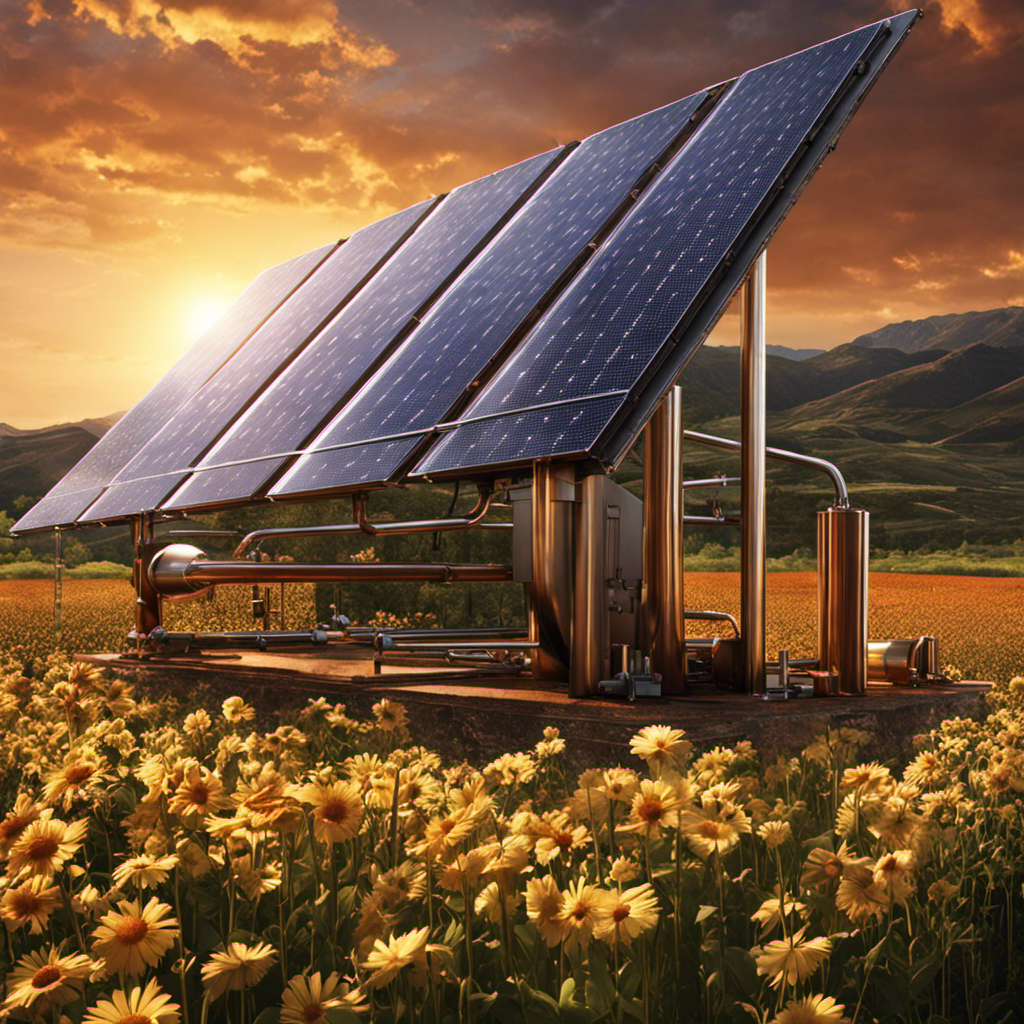
Did you realize that solar thermal energy has the potential to fulfill up to 80% of a household’s hot water requirements?
In this article, I will explain the fascinating workings of solar thermal energy. Solar collectors, which absorb sunlight and convert it into usable heat, play a crucial role in this process.
I will delve into the intricacies of heat transfer in solar thermal systems, explore various applications, and discuss the advantages and limitations of this renewable energy source.
Join me on this journey as we uncover the future potential of solar thermal technology.
Key Takeaways
- Solar thermal energy uses the sun’s radiation to produce heat, which can be used to generate electricity or heat water for residential and commercial purposes.
- Solar thermal power plants concentrate the sun’s rays onto a receiver containing a fluid that absorbs the heat, which is then used to generate steam and drive a turbine for electricity production.
- Different types of solar collectors, such as flat plate collectors, evacuated tube collectors, and parabolic trough collectors, are used to capture and convert solar energy into usable heat.
- The efficiency of solar collectors varies, with evacuated tube collectors generally having higher efficiency and being more suitable for residential and small-scale applications, while parabolic trough collectors are better for large-scale power generation projects. Understanding the efficiency of different collectors helps in making informed decisions based on specific application requirements.
The Basics of Solar Thermal Energy
To understand the basics of solar thermal energy, you need to know how it harnesses the power of the sun to generate heat. Solar thermal energy is a renewable energy source that uses the sun’s radiation to produce heat. This heat is then used to generate electricity or to heat water for residential and commercial purposes.
One of the advantages of solar thermal energy is its ability to provide clean and sustainable power. Solar thermal power plants use large mirrors or lenses to concentrate the sun’s rays onto a receiver, which contains a fluid that absorbs the heat. This fluid is then used to generate steam, which drives a turbine to produce electricity.
Solar thermal power plants are efficient and can provide a consistent source of power, making them a promising solution for meeting our energy needs.
Understanding Solar Collectors
When it comes to harnessing solar energy, understanding the different types of solar collectors and their efficiency is crucial.
Solar collectors come in various forms, such as flat plate collectors, evacuated tube collectors, and parabolic trough collectors, each with its own advantages and disadvantages.
Evaluating the efficiency of solar collectors is essential in determining how effectively they can convert sunlight into usable energy, as factors like heat loss and absorption rates play a significant role.
Types of Solar Collectors
Solar thermal energy harnesses the power of the sun through various types of solar collectors. Two common types of solar collectors used in solar thermal systems are parabolic trough and evacuated tube collectors.
A parabolic trough collector consists of a long, curved mirror that reflects sunlight onto a receiver tube positioned at the focal point of the parabola. The receiver tube contains a heat transfer fluid, such as oil or water, which absorbs the concentrated solar energy and carries it to a heat exchanger. The heat exchanger then transfers the heat to a fluid medium, such as water, which can be used for various applications, including space heating or electricity generation.
On the other hand, an evacuated tube collector consists of a series of glass tubes, each containing a metal absorber plate. The tubes are evacuated, creating a vacuum, which minimizes heat loss. When sunlight hits the absorber plate, it converts the solar energy into heat, which is then transferred to a fluid medium flowing through the tubes.
Both parabolic trough and evacuated tube collectors are effective at capturing solar energy and converting it into usable heat. The choice between the two depends on factors such as cost, efficiency, and specific application requirements.
Efficiency of Solar Collectors
Both parabolic trough and evacuated tube collectors have different levels of efficiency, so choosing the right type depends on specific application requirements. To understand the efficiency of solar collectors, it is important to consider how they convert sunlight into usable energy. The efficiency of a collector is determined by its ability to capture and convert solar radiation into heat. Improving performance and maximizing output are essential in order to make the most of solar thermal energy.
To illustrate the differences in efficiency between parabolic trough and evacuated tube collectors, let’s take a look at the following table:
| Collector Type | Efficiency | Advantages |
|---|---|---|
| Parabolic Trough | High | Suitable for large-scale power generation |
| Evacuated Tube | Very High | Excellent for residential and small-scale applications |
As you can see, evacuated tube collectors generally have a higher efficiency compared to parabolic trough collectors. This makes them ideal for residential and small-scale applications where maximizing output is crucial. On the other hand, parabolic trough collectors are more suitable for large-scale power generation projects. By understanding the efficiency of different solar collectors, we can make informed decisions that align with specific application requirements and ultimately contribute to a more sustainable future.
Heat Transfer in Solar Thermal Systems
When it comes to heat transfer in solar thermal systems, two key points to consider are fluid circulation for efficiency and heat absorption mechanisms.
Fluid circulation plays a crucial role in maximizing the efficiency of the system by ensuring a continuous and optimized transfer of heat.
Understanding the heat absorption mechanisms is equally important as it allows for a deeper comprehension of how the system captures and utilizes solar energy.
Fluid Circulation for Efficiency
To maximize efficiency, you need to ensure proper fluid circulation in solar thermal energy systems. Improving performance and ensuring effective heat distribution are crucial for the optimal functioning of these systems. Here are three key factors to consider:
-
Pump Selection: Choosing the right pump is essential for efficient fluid circulation. Consider factors such as flow rate, head pressure, and energy consumption when selecting a pump. A well-designed pump system will ensure smooth and consistent flow, enhancing heat transfer.
-
Proper Piping Design: The piping layout should be carefully planned to minimize pressure drops and maximize heat transfer. Optimal pipe sizing, insulation, and routing can significantly improve system performance. Additionally, incorporating flow control valves and sensors can help monitor and maintain the desired fluid circulation.
-
System Maintenance: Regular maintenance is essential to ensure continued efficiency. Flushing the system, checking for leaks, and cleaning components are crucial for maintaining proper fluid circulation and preventing performance degradation.
Heat Absorption Mechanisms Explained
The heat absorption mechanisms in solar thermal systems can be explained by understanding how different components work together.
In the absorption process, solar radiation is collected by the solar collector, which consists of a black surface that absorbs the sun’s energy. This absorbed energy is then transferred to a working fluid, which circulates through the collector.
The working fluid, typically a liquid such as water or an antifreeze solution, absorbs the heat and undergoes a phase change, converting from a liquid to a vapor. This vapor then enters a heat exchanger, where it transfers its heat to a secondary fluid, which can be used for various purposes such as heating water or generating electricity.
This heat transfer process follows a thermodynamic cycle, where the working fluid undergoes repeated cycles of absorption, heat transfer, condensation, and re-evaporation. Understanding these heat absorption mechanisms is crucial for designing and optimizing solar thermal systems for maximum efficiency.
Solar Thermal Applications and Uses
Solar thermal energy can be used for a variety of applications and has many uses. Here are three key uses of solar thermal energy:
-
Solar thermal power plants: These plants use sunlight to generate electricity by harnessing the heat from the sun. Mirrors or lenses focus the sunlight onto a receiver, which heats a fluid to produce steam. The steam then drives a turbine to generate electricity.
-
Solar water heating: Solar thermal energy can be used to heat water for various purposes, such as domestic hot water or swimming pools. Solar water heaters consist of collectors that absorb sunlight and transfer the heat to water, which can then be used for different applications.
-
Industrial processes: Solar thermal energy can be utilized in various industrial processes that require heat, such as drying or preheating. This can help reduce the reliance on fossil fuels and decrease greenhouse gas emissions.
Overall, solar thermal energy offers a sustainable and efficient way to meet our energy needs while minimizing environmental impact.
Advantages and Limitations of Solar Thermal Energy
One of the advantages of solar thermal energy is its ability to reduce greenhouse gas emissions. By harnessing the sun’s energy to generate heat, solar thermal systems can provide a clean and sustainable alternative to traditional fossil fuel-based heating methods. Additionally, solar thermal energy offers several other benefits, including cost effectiveness and minimal environmental impact.
Solar thermal systems are highly cost effective in the long run, as they require minimal maintenance and have a lifespan of up to 30 years. The initial installation costs may be higher compared to conventional systems, but the savings in energy bills and the potential for government incentives make it a worthwhile investment.
In terms of environmental impact, solar thermal energy has a significantly lower carbon footprint compared to fossil fuel-based heating systems. The table below highlights some key points regarding the cost effectiveness and environmental impact of solar thermal energy.
| Advantages of Solar Thermal Energy | |
|---|---|
| Cost effectiveness | Minimal environmental impact |
| Long lifespan and low maintenance | Reduced greenhouse gas emissions |
| Energy bill savings | Renewable and sustainable energy source |
Overall, solar thermal energy offers a viable solution for reducing greenhouse gas emissions and promoting a cleaner and more sustainable future. Its cost effectiveness and minimal environmental impact make it an attractive option for both residential and commercial applications.
The Future of Solar Thermal Technology
In considering the future of solar thermal technology, there are several exciting developments on the horizon. Here are three key areas that show promise:
-
Advanced materials: Researchers are exploring new materials that can enhance the efficiency of solar thermal systems. For example, using nanomaterials with high thermal conductivity could improve heat transfer and increase overall performance.
-
Energy storage: One of the limitations of solar thermal energy is its dependence on sunlight availability. However, advancements in energy storage technologies, such as high-temperature heat storage systems, could help address this issue. These systems can store excess heat during sunny periods and release it when needed, enabling more consistent energy generation.
-
Cost reduction: The economic viability of solar thermal technology is crucial for its widespread adoption. Ongoing research aims to reduce the manufacturing and installation costs of solar thermal systems. This includes exploring innovative manufacturing techniques and optimizing system design to make solar thermal energy more affordable and accessible.
Overall, the future developments in solar thermal technology hold great potential for improving efficiency, reliability, and economic viability, making it a sustainable energy option for the future.
Frequently Asked Questions
What Is the Difference Between Solar Thermal Energy and Solar Photovoltaic Energy?
The difference between solar thermal energy and solar photovoltaic energy lies in the way they harness the sun’s energy.
Solar thermal energy uses the sun’s heat to generate electricity or heat water for various applications.
On the other hand, solar photovoltaic energy converts sunlight directly into electricity using solar panels.
Solar thermal energy has the advantage of being able to store heat for later use, but it requires more space and is less efficient at converting sunlight into electricity compared to photovoltaic energy.
How Does Solar Thermal Energy Compare to Other Renewable Energy Sources in Terms of Efficiency?
When comparing the efficiency of solar thermal energy to other renewable sources, such as wind power, it’s important to consider various factors.
Solar thermal energy is known for its impressive efficiency, as it harnesses the power of the sun to generate heat and electricity.
However, in terms of cost effectiveness, solar thermal energy may not always be the most economical option when compared to geothermal energy.
Overall, a comprehensive analysis is required to fully understand the efficiency and effectiveness of solar thermal energy.
Can Solar Thermal Systems Be Used for Both Residential and Commercial Applications?
Solar thermal systems are versatile and can be used for both residential and commercial applications. They offer a cost-effective solution for heating water and spaces.
In residential settings, solar thermal systems can provide hot water for showers, laundry, and dishwashing.
In commercial applications, they can be used to provide hot water for large-scale operations, such as hotels and restaurants.
The initial investment in installing a solar thermal system can be recouped over time through energy savings, making it a smart choice for both residential and commercial use.
What Are the Main Factors That Affect the Performance of a Solar Thermal System?
When considering the performance factors of a solar thermal system, several key elements come into play.
These include the design and size of the system, the efficiency of the collector, the amount of sunlight available, and the overall maintenance of the system.
By optimizing these factors, one can achieve higher solar thermal efficiency.
It is crucial to properly size and maintain the system to ensure optimal performance and maximum energy output.
Are There Any Government Incentives or Subsidies Available for Installing Solar Thermal Systems?
Yes, there are government incentives and subsidies available for installing solar thermal systems. These incentives aim to promote the adoption of renewable energy sources and reduce greenhouse gas emissions.
By installing solar thermal systems, individuals and businesses can benefit from various economic advantages. These include tax credits, grants, and rebates, which can significantly reduce the upfront costs of installation.
Additionally, solar thermal systems can lead to long-term savings on energy bills, making them a financially attractive investment.
Conclusion
In conclusion, solar thermal energy is a remarkable technology that harnesses the power of the sun to generate heat. Its efficiency lies in the ingenious design of solar collectors, which capture sunlight and convert it into usable energy.
Through the process of heat transfer, solar thermal systems can provide hot water, space heating, and even electricity. This makes it a versatile and practical solution for various energy needs.
While it has its advantages, such as sustainability and cost-effectiveness, there are also limitations to consider. Factors like weather conditions and the availability of sunlight can affect the performance of solar thermal systems. Additionally, the initial installation costs can be high, although they are generally offset by long-term savings on energy bills.
Nonetheless, the future of solar thermal technology holds great promise. Ongoing research and development efforts are focused on improving efficiency and reducing costs. As advancements continue, solar thermal energy will play an increasingly important role in illuminating a path towards a greener and more sustainable future.
-
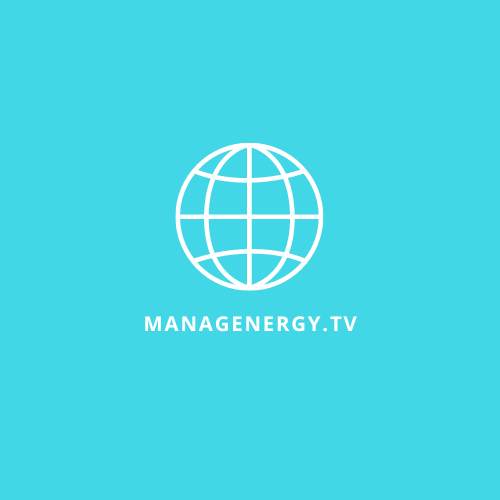
 Sustainable Supply Chain Management3 months ago
Sustainable Supply Chain Management3 months agoManagEnergy Acquires GPST2030.org Domain to Strengthen Commitment to Sustainable Transport
-
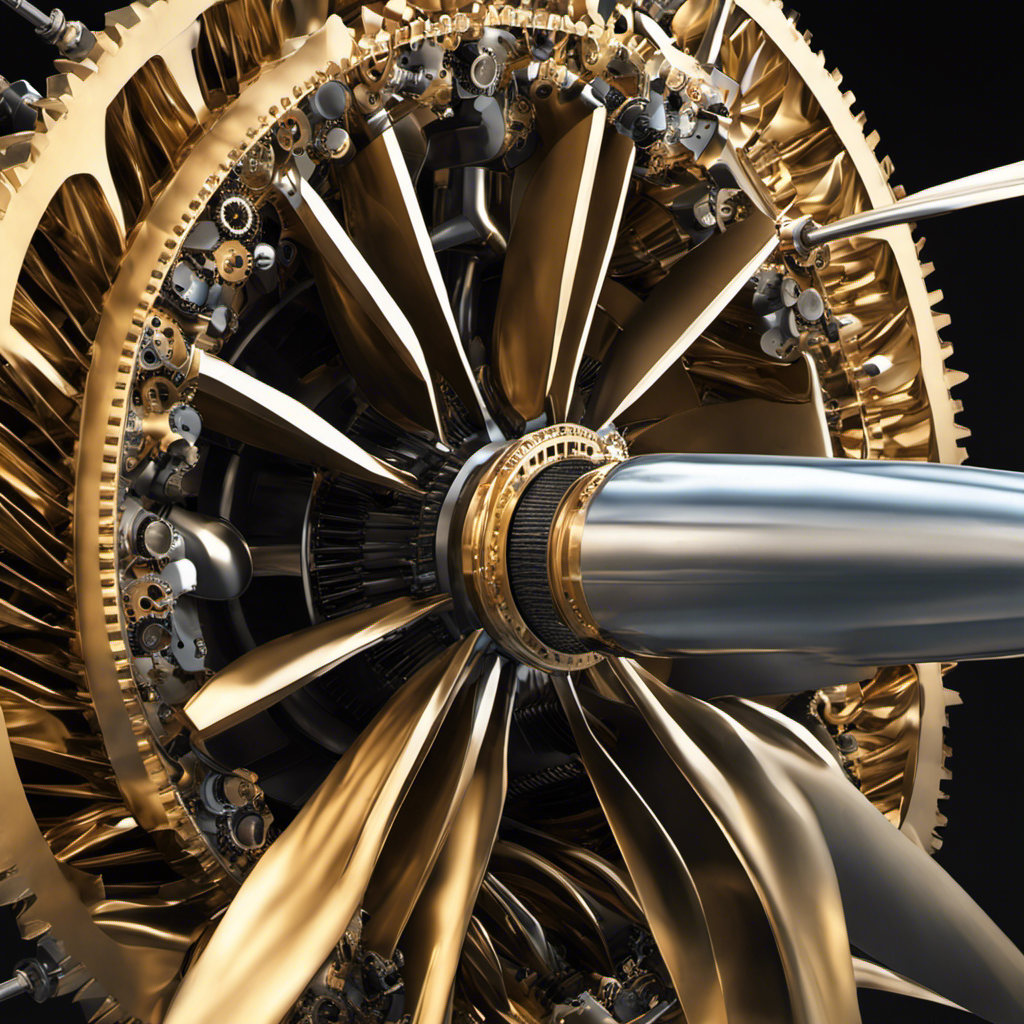
 Wind Energy3 months ago
Wind Energy3 months agoHow Much Oil Does It Take To Lubricate A Wind Turbine
-

 Electric Motorbike1 month ago
Electric Motorbike1 month agoCalifornia Electric Motorcycle Laws: A Comprehensive Guide to Riding Safely
-

 Solar3 months ago
Solar3 months agoIn 2009, About What Percent Of U.S. Energy Consumption Was Supplied By Solar Energy
-

 Electricity Vehicle1 month ago
Electricity Vehicle1 month agoThe Future of Electric Vehicles: Trends and Innovations to Watch
-

 Wind Energy1 month ago
Wind Energy1 month agoRevolutionizing Highways: Wind Turbines Take the Road to Renewable Energy
-

 Wind Energy1 month ago
Wind Energy1 month agoEnvironmental Innovation Turned Deadly: Ocean Wind Turbines Pose Threat to Whales’ Survival
-
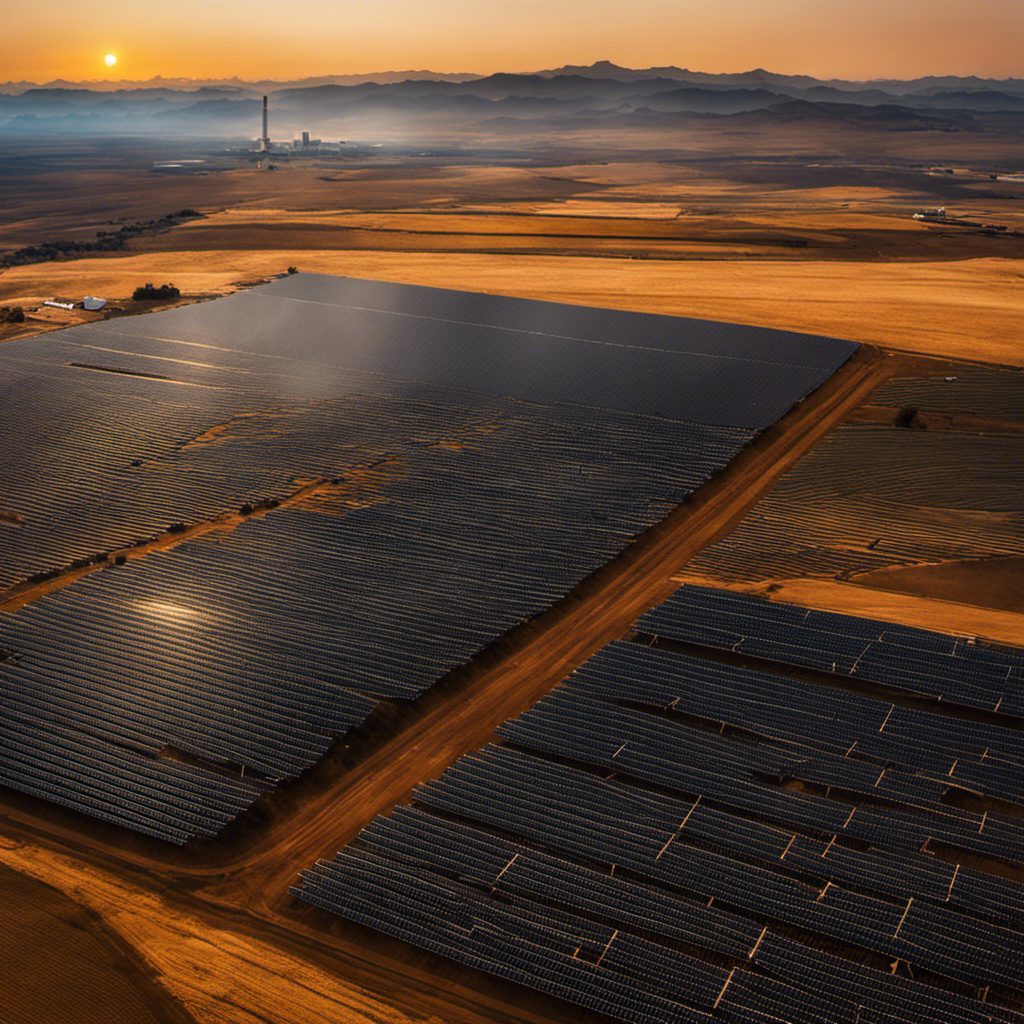
 Solar3 months ago
Solar3 months agoWhy Should We Use Solar Energy Instead Of Fossil Fuels
